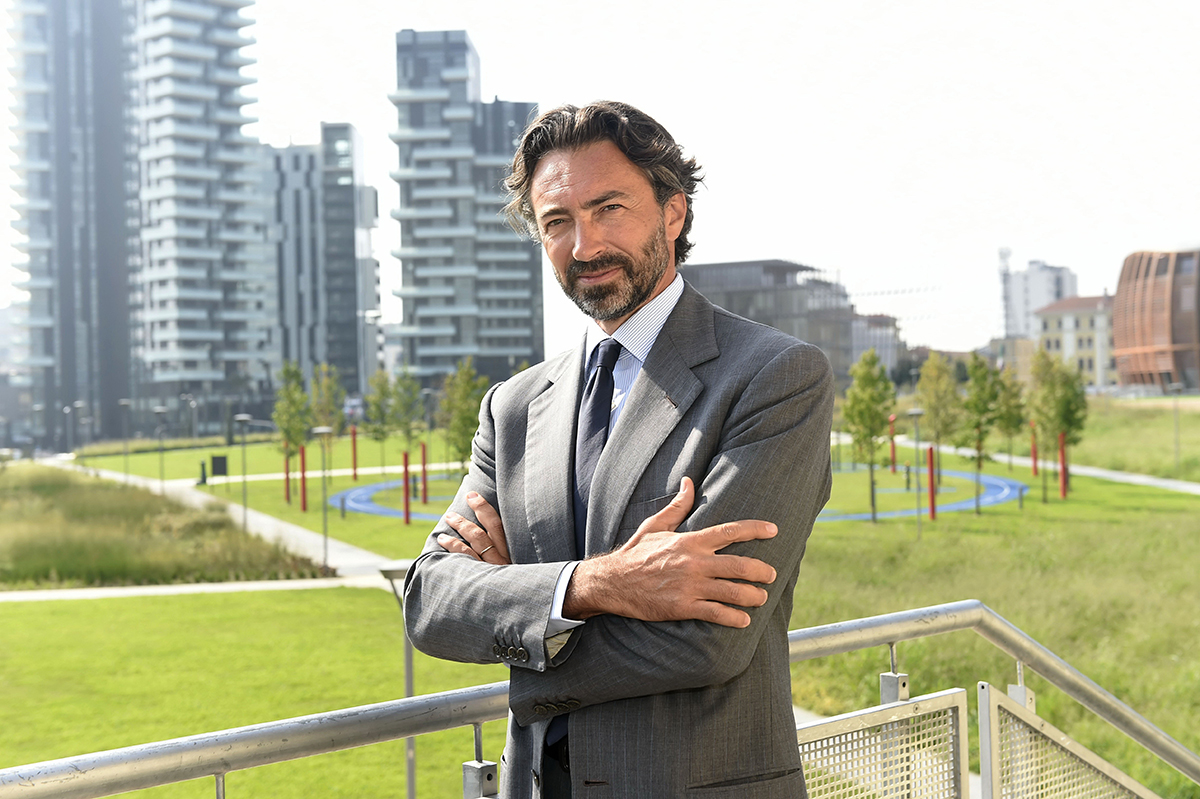
Manfredi Catella, CEO of COIMA and president of the Riccardo Catella Foundation
Manfredi Catella is the CEO of COIMA, the real estate company behind Porta Nuova in Milan, one of the most important real estate developments in Europe. He is also president of the Riccardo Catella Foundation which aims to promote sustainable and responsible urban development by improving and animating public spaces. Here, Catella discusses transforming urban environments, mixing business with philanthropy and how technology advances sustainability efforts
LUX: The Riccardo Catella Foundation has had an interest in promoting sustainability long before sustainability became a buzzword, how did this come about?
Manfredi Catella: The Riccardo Catella Foundation was established in 2005 in honour of my father, the entrepreneur Riccardo Catella. At the time, not many entities were focused on promoting ESG (Environmental, Social, Governance), or impact indicators in investments, and we felt it could be our contribution to set up a non-profit organisation committed to promoting sustainable territorial development. We also have the ambition to educate communities about the effects of climate change and what actions need to be taken to fight and prevent this phenomenon. We do this through a citizen engagement program of civic-cultural projects within the realm of green and public spaces in the city of Milan. We believe it is important to listen to citizens in order to understand their vision for the urban space surrounding their homes and integrate programs and services that can improve their quality of daily life.
Follow LUX on Instagram: luxthemagazine
LUX: What is the most exciting philanthropic project you are currently working on and why?
Manfredi Catella: At the moment, the philanthropic project where we are dedicating a lot of our energy to is The Riccardo Catella Foundation’s management of Milan’s third largest park, BAM (Biblioteca degli Alberi Milano), which we undertook together with COIMA on behalf of the Municipality of Milan. It is the first public private partnership in Italy that allows a private foundation to manage such a vast public and green space in the city centre. The 10 hectares of the botanical garden, which was developed by COIMA as part of its Porta Nuova development, is a ground-breaking project that aims to involve companies, non-profit sector, and citizens (BAMFriends) in the management of a public area. In addition, we animate the park through a cultural program based on four pillars: open-air culture, education, wellness and nature.
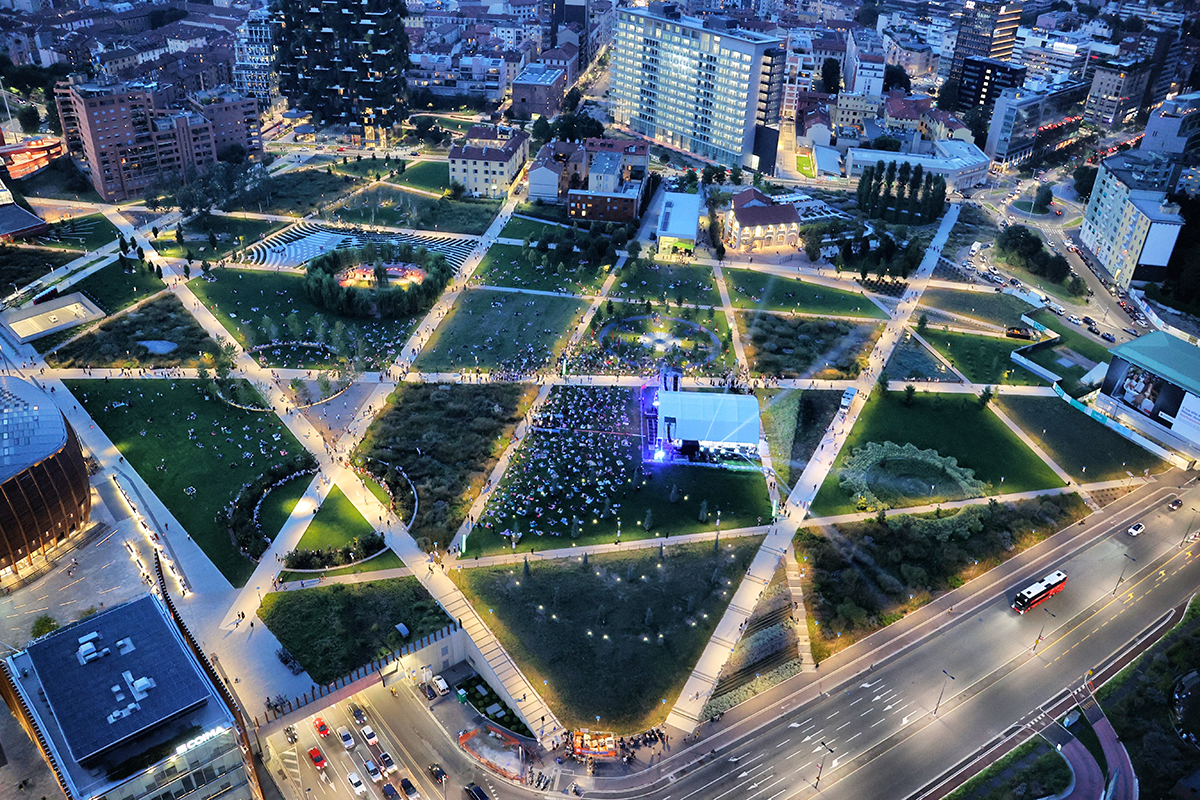
BAM (Biblioteca degli Alberi Milano) is Milan’s third largest park, managed by The Riccardo Catella Foundation
Ensuring the safety of the local community in the outside spaces has been particularly important since the start of the pandemic. We have been increasing services to enable greater green mobility over the past year. The changes are visible to park visitors. In outdoor areas, new bike racks have been set up, with information on anti Covid-19 measures, sanitising gel dispensers and continuous sanitisation services for floors, children’s playgrounds and communal areas. Safety is the starting point for a series of inclusive initiatives such as Wi-Fi enhancement and the launch of the Porta Nuova Milano app, which is designed to book events and services in the area.
LUX: Please explain your workings in neighbourhood community management?
Manfredi Catella: COIMA believes that the only way for the built environment to help fight climate change and to promote diversity is to integrate them into the basic economic, social and environmental model of every real estate development and by setting measurable objectives and transparently reporting on those objectives. We believe in placing nature and humans at the centre of all real estate development and urban regeneration schemes. In Porta Nuova, we have created a thriving urban environment that enables constant interaction between nature and architecture. There are walkways, green spaces, and piazzas with spaces created for exercise, relaxation, and socialising, all of which welcomes 10 million people every year. It includes Biblioteca Degli Alberi Milano (BAM), an innovative urban park and botanical garden, which plays host to a diverse programme of cultural events and activities for residents, workers, and visitors alike.
Read more: Michelin-starred high altitude dining in Andermatt
LUX: Why do you think it is important to mix business with philanthropy?
Manfredi Catella: In general, the corporate approach to philanthropy has really evolved, and over the last ten years in particular, there has been a shift towards a model of collaboration and sustainable, long-term initiatives. It is important to mix business with philanthropy because corporations have a highly influential role on the social and natural world in which we live. It is also important as sustainable business models have a strong track record of delivering superior returns. Corporate philanthropy is no longer about simply giving money and walking away. By using the skills, tools, and approach of our business, we can continuously monitor the impact of our work and ensure it is having the best possible outcome for those who need it.
The pandemic has highlighted the fragile nature of our world and we believe that business has a duty to create positive change and a sustainable future as we recovery economically from Covid. This led us to establish the COIMA ESG City Impact Fund in 2020; an investment fund focused on sustainable urban regeneration. We aim to use this fund to redesign new physical and social models for housing, tourism and urban regeneration of neighbourhoods and believe that sustainable real estate can play a central role in a post Covid recovery. As responsible managers of institutional capitol from all over the world, we believe can help shape the future.
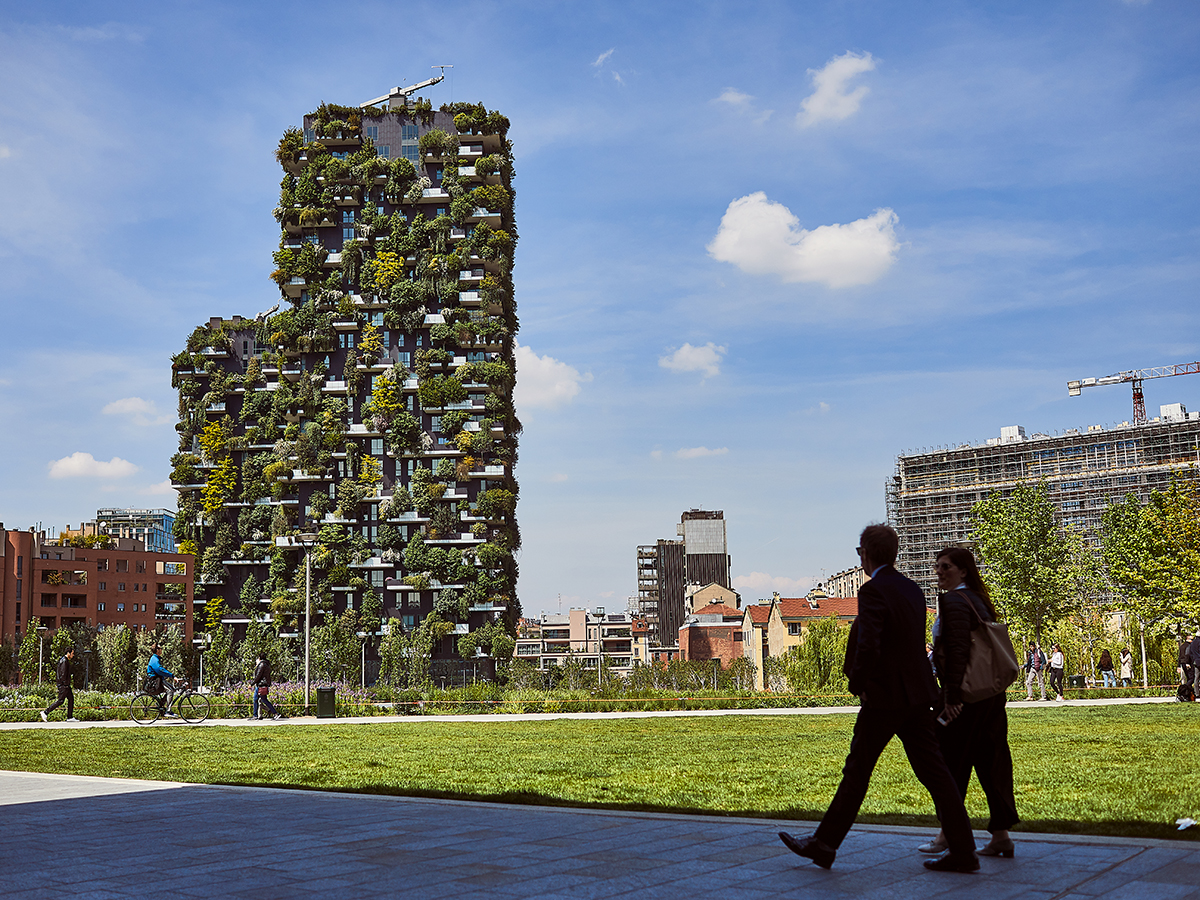
Bosco Verticale was designed by Boeri Studio, and built and managed by COIMA as part of the Porta Nuova development
LUX: Apart from sustainability projects, are there any other philanthropic causes you have a particular interest in?
Manfredi Catella: Since 2018, we have been promoting an important social inclusion project through the Riccardo Catella Foundation, together with the Dynamo Camp association, called the Porta Nuova Smart Camp. It is an inclusive and innovative project for children both with and without serious pathologies and disabilities. Nature, sustainable architecture, and technological innovation are topics at the centre of the camp’s activities, along with incorporating the values of the Foundation and the community of COIMA’s Porta Nuova development.
LUX: How has working closely with local communities over the last 10 years changed your outlook on real estate development?
Manfredi Catella: We are recognised as a sustainable real estate company because it has long been our goal to create projects with a strong positive social and environmental impact on its community. The past year has reaffirmed that we all need to continue conducting our business and investing in a responsible way. The past ten years has taught us that it is essential to always look at the bigger picture. For us, this means that we look at a neighbourhood scale instead of a single building. By doing this, we can effectively redevelop urban spaces and provide a selection of amenities to better serve a variety of city users. For example, the COIMA ESG City Impact Fund has just acquired the railway yard of Porta Romana in Milan, together with Covivio and Prada, and we are very excited about exploring this neighbourhood scale development.
Read more: Alia Al-Senussi on art as a catalyst for change
Through our passion and experience, we have also developed our own sustainable vision called COIMA Roots which focuses on driving sustainable, economic, and social performance across our developments. COIMA Roots has been created in line with our belief that humans and nature should sit at the heart of all urban regeneration and development. To accomplish this, our set of values, or roots, are nature, beauty, affordability, human, happiness, ethics, service, and knowledge.
LUX: What were your principal goals when creating the Riccardo Catella Foundation?
Manfredi Catella: When we started the Riccardo Catella Foundation, our goal was to actively support the local economy and to promote the culture of sustainability and innovation in territorial development. We also wanted to make sure we were improving the quality of urban life and public green spaces through the foundation’s cultural projects. I feel that the challenge to create a place of nature, inclusion and growth in the heart of the city at the BAM park will be one of our challenges over the coming years. We are working to create a park that engages the community through a rich cultural programme inspired by sustainability but at the same time would like to create a sustainable business model that could be replicable for other parks in other cities around the world.
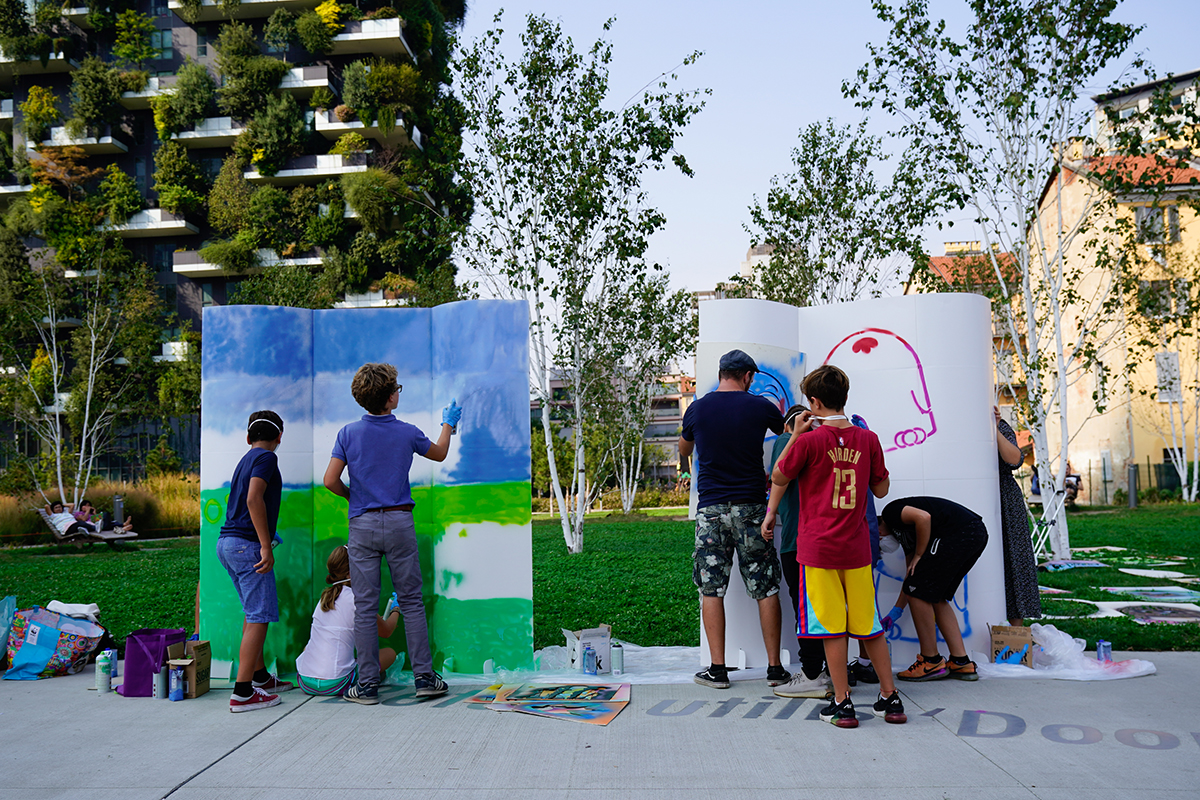
A street art project at BAM in Milan
LUX: The Riccardo Catella Foundation has been around for almost 15 years. What has been the most significant change in sustainability during this time?
Manfredi Catella: Two main drivers: awareness and technology. When we began the foundation, sustainability and climate change was not a common topic as it is today. In recent years, we have witnessed a major shift and an increased awareness and now all players, from the public administrations to corporate to citizens, are recognising the need for urgent concrete action. Also, today, we have technological solutions that before were not available and it is fundamental to stay at the forefront of these technologies to continue to push the bar in integrating these solutions in development.
LUX: Which regeneration projects by others have particularly impressed or even inspired your philanthropic efforts?
Manfredi Catella: When we began working on the proposal for the management of BAM, we visited many parks around the world, including The High Line in New York and Millennium Park in Chicago. Then we worked on creating our own interpretation that would integrate well into the city of Milan.
LUX: Is there a major difference in approach between European, Asian and American organisations involved in philanthropic urban regeneration programmes?
Manfredi Catella: Across Europe, philanthropic engagement is an integral part of corporate social responsibility and reinforces related strategies. More and more companies of all sizes are dedicating financial resources, products, knowledge, and time to the common good. The world of philanthropy is renewing itself and dated foundations are starting to make way for a new approach to charity that incorporates social purpose and sustainability through impact investing. We believe that impact investing will become mainstream and that the positive environmental and social contribution will be integrated into traditional investments. We are dedicated and are working actively in that direction.
Find out more: coima.com

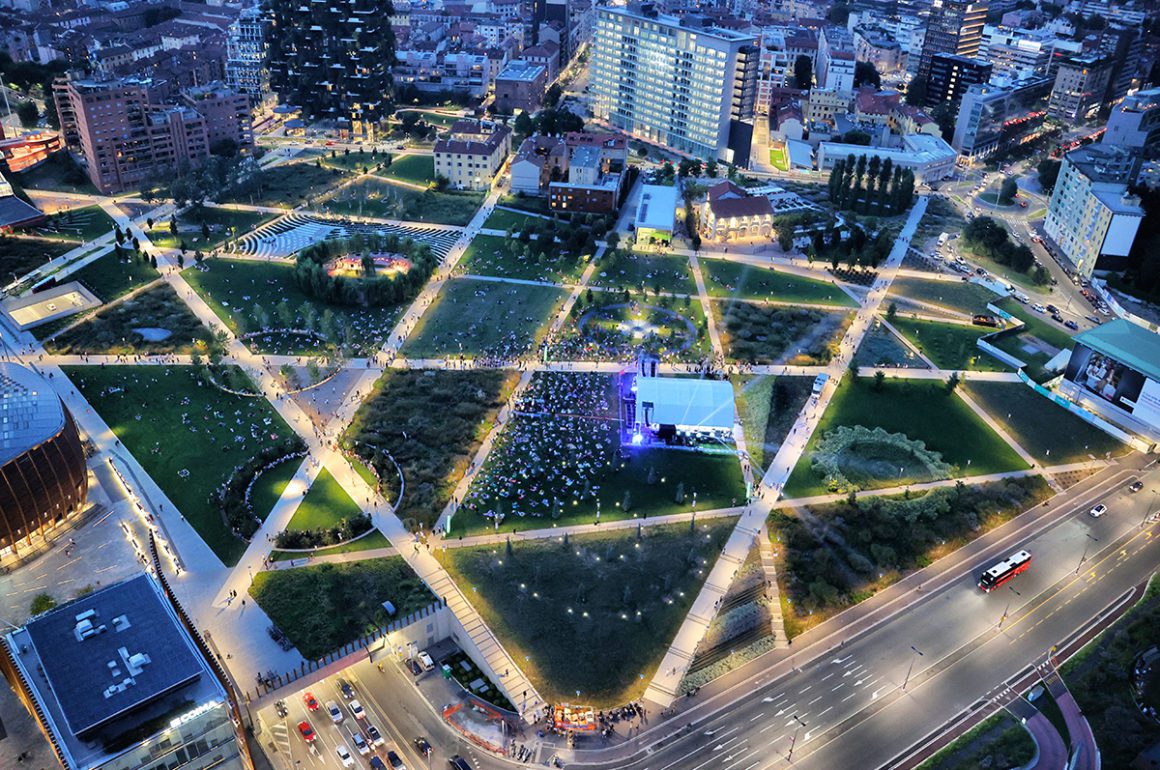





Recent Comments